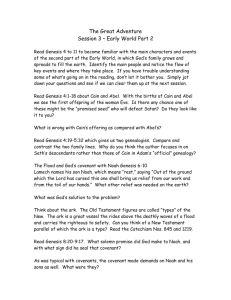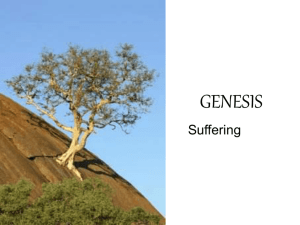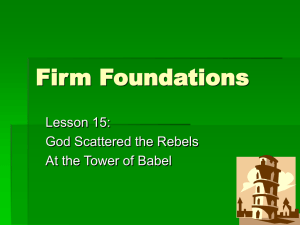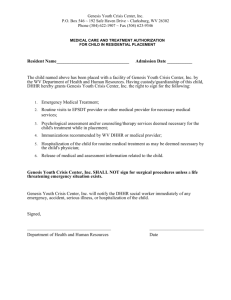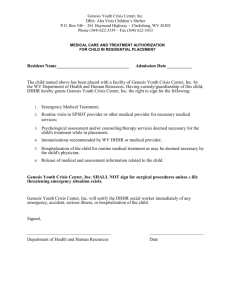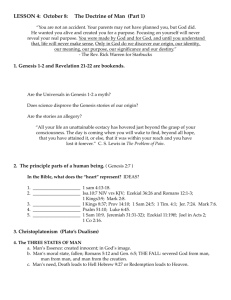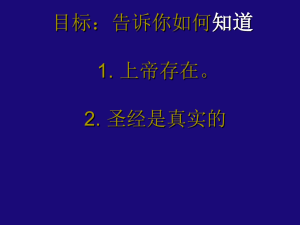Old Testament Biblical Backgrounds
advertisement
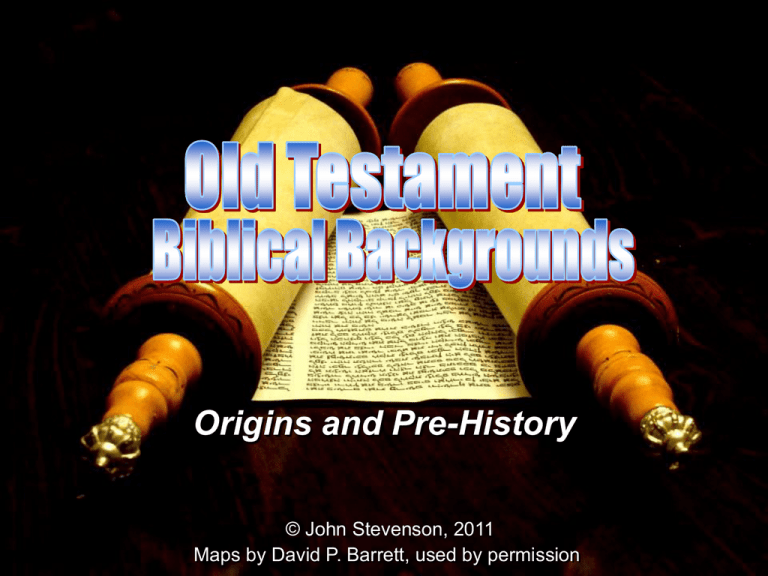
Origins and Pre-History © John Stevenson, 2011 Maps by David P. Barrett, used by permission Nippur Tablet Containing Flood story Ennuma Elish “When on high…” Aspu Tiamat Primitive forces & Gods Tiamat Marduk Primitive forces & Gods Marduk Kingu Primitive forces & Gods Similarities and Differences with the Creation Account Similarities • World without form & void • Similar order & events • Seven tablets & seven days of creation Differences • Polytheism versus monotheism • Confusing of spirit & matter Ennuma Elish Genesis Account Tiamat engulfs world in The world was a primal chaos. unformed and unfilled. Light comes from the gods. Marduk makes the stars of the zodiac and ordains the year. Marduk makes man from the blood of Kingu. God brings light into existence. God sets sun and moon for signs, seasons, days, and years. God creates man in His own image and likeness. Ennuma Elish Genesis Account Moses is giving to us a refutation of the accepted mythos that was held in antiquity as he goes point by point to show that God is the true Creator of heaven and earth. • Mesopotamian myth containing creation and flood story • Our oldest copy dates to age of Hammurabi • Junior gods begin to complain because their toil is too heavy • Man is created to take up the slack • Man makes too much noise and flood comes • Wise King Atrahasis warned so that he can build an ark and escape The Book of Beginnings Genesis 1-11 Genesis 12-50 Events Predominant People Predominant – Creation – Fall – Flood – Tower of Babel – Abraham – Isaac – Jacob – Joseph Race as a whole Family of Abraham Over 2000 years 250 years Genesis 1:1 In the beginning God created the heavens and the earth. • The “who” of creation. • The work of creation. • The “what” of creation. Genesis 1:1-2 In the beginning God created the heavens and the earth. And the earth was unformed and unfilled, and darkness was over the surface of the deep; and the Spirit of God was moving over the surface of the waters. Unformed Unfilled Day 1: Light Day 4: Light-bearers (sun, moon, stars) Day 2: Water & sky divided Day 5: Fish & birds to fill water & sky Day 3: Dry land & vegetation Day 6: Land animals & man Day 7: Sabbath Rest Genesis 1 The Israelite Experience Light and darkness They had seen God are made by God on bring light and darkness Day 1 over Egypt A division of the waters on Day 2 They had passed through the Red Sea The sun and moon Egyptians worshiped and stars created on the sun and moon and Day 4 stars and had seen the sun darkened in Egypt. Genesis 1 The Israelite Experience Man is created in the image of God Only the Pharaoh was thought to be in the image of God Man is told to rule over the earth Only the Pharaoh had the right of rulership Man is placed into a Israelites are tempted to beautiful garden return to the meats of Egypt, but Canaan is the new promised Eden. Why are there two separate accounts of creation? Genesis 1 Genesis 2 The heavens and the earth are created in six days. Man in his cosmic setting Creation of the man and woman (no time element mentioned). Man as central to God’s purpose Panorama of creation Detailed focus on one as a whole aspect of creation Centers on God Centers on man as the creating the heavens crowning act of God’s and the earth creation Theories of Creation • • • • • Supernatural versus Evolutionary. A Superficial Appearance of History. The Gap Theory. The Day/Age Theory. The Non-Sequential Theory / Framework Theory. I personally take the view that Genesis 1 and 2 relate to each other the way Judges 4 and 5 and Exodus 14 and 15 do. In each couplet one chapter describes a historical event and the other is a song or poem about the theological meaning of the event. When reading Judges 4 it is obvious that it is a sober recounting of what happened in the battle, but when we read Judges 5, Deborah’s Song about the battle, the language is poetic and metaphorical. When Deborah sings that the stars in the heavens came down to fight for the Israelites, we understand that she means that metaphorically. I think Genesis 1 has the earmarks of poetry and is therefore a “song” about the wonder and meaning of God’s creation. Genesis 2 is an account of how it happened (The Reason for God, pg 93-94). Theories of Creation • • • • • Supernatural versus Evolutionary. A Superficial Appearance of History. The Gap Theory. The Day/Age Theory. The Non-Sequential Theory / Framework Theory. • The Literal Interpretation. …general revelation in creation, as well as the special revelation of Scripture, is also the voice of God. We live in a “universe,” and all truth speaks with one voice (2001:77). Creation complete: Heavens & earth created; God finished His work (1-3) Man created: Formed from dust (4-9) Trees & Rivers in garden given names (9-14) CUSH ? Havilah TEMPTATION SEAL The Gilgamesh Epic and the Temptation Account • Gilgamesh, king of Erech • People pray to Anu, the sky god • He fashions Enkidu, a wild man of the forest • Trapper’s son gets prostitute to entice Enkidu • He yields, loses his power, but gains knowledge Gilgamesh Epic Bible Anu creates Enkidu, the wild man of the forest God creates Adam and puts him in the garden of Eden Enkidu is naked in the forest Adam and Eve are naked in the garden Enkidu is tempted by the prostitute Enkidu falls to her charms, loses strength, but gains knowledge Adam is given the forbidden fruit by Eve Adam sins, his eyes are opened and he is removed from the garden The Gilgamesh Epic and the Temptation Account • Enkidu and Gilgamesh become friends • Enkidu dies and Gligamesh goes on a quest to find a way to bring him back to life • Gilgamesh is given a plant that will let him live forever • A serpent comes and eats the plant Creation complete: Heavens & earth created; God finished His work (1-3) Man created: Formed from dust (4-9) Trees & Rivers in garden given names (9-14) Man assigned task of guarding & keeping the garden (15) Forbidden fruit (16-17) And the LORD God commanded the man, saying, "From any tree of the garden you may eat freely; 17 but from the tree of the knowledge of good and evil you shall not eat, for in the day that you eat from it you shall surely die.“ (Genesis 2:16-17) Creation complete: Heavens & earth created; God finished His work (1-3) Man created: Formed from dust (4-9) Trees & Rivers in garden given names (9-14) Man assigned task of guarding & keeping the garden (15) Forbidden fruit (16-17) Man in need of a helper: not good to be alone (18) Animals in garden are given names (19-20) Woman created: Formed from rib (21-24) Creation complete: Man & woman naked & unashamed in presence of God (25) When the woman saw that the tree was good for food, and that it was a delight to the eyes, and that the tree was desirable to make one wise, she took from its fruit and ate; and she gave also to her husband with her, and he ate. (Genesis 3:6) What are the results from their actions of taking and eating the forbidden fruit? And I will put enmity between you and the woman, and between your seed and her seed; He shall bruise you on the head, and you shall bruise him on the heel. (Genesis 3:15) Seed of the Serpent Seed of the Woman Cain & Abel How is the Cain & Abel narrative related to the larger story of Genesis? Seed of the Serpent Cain Lamech Literally, “another SEED” Seed of the Woman Abel And Adam had relations with his wife again; and she gave birth to a son, and named him Seth, for, she said, "God has appointed me another offspring in place of Abel; for Cain killed him." (Genesis 4:25). Seed of the Serpent Cain Seed of the Woman Abel & Seth Enoch Lamech Noah Ham Shem Canaan Abraham Terah Reu Shelah Noah Enoch Kenan Firstborn Death Adam 1000 900 800 700 600 500 400 300 200 100 0 Earliest Civilization • • • • • Cities Polygamy Nomadic Herdsmen Musical Instruments Bronze & Iron Genesis 6:1-2 Now it came about, when men began to multiply on the face of the land, and daughters were born to them, 2 that the sons of God saw that the daughters of men were beautiful; and they took wives for themselves, whomever they chose. Genesis 6:3 Then the LORD said, “My Spirit shall not strive with man forever, because he also is flesh; nevertheless his days shall be one hundred and twenty years.” Genesis 6:4 The Nephilim were on the earth in those days, and also afterward, when the sons of God came in to the daughters of men, and they bore children to them. Those were the mighty men who were of old, men of renown. Sons of God refer to Angels • Septuagint supports this interpretation • Sons of God are angels in Job • Angels in heaven do not marry, but these angels were not in heaven • The resulting offspring produced giants • Supported in Apocryphal book of Enoch as well as in Jude 6. Sons of God refer to Descendants of Seth • Preceding chapters set forth contrast of two lines • Men began to call on the name of the Lord • It is mankind that is punished in the flood • Sonship is a common theme in the Old Testament • Marriage of godly seed to ungodly people is a common theme in Genesis Sons of God refer to Kings and Rulers • Aramaic lends itself to this interpretation • Elohim refers to human judges in Ex 21:6; 22:8-9 and in Psalm 82:1, 6 • Similar use in Babylonian texts • Kings often referred to as Elohim in east • Actions paralleled in Lamech • Nephilim refer to fallen ones Noah’s three sons (6:10) Covenant with Noah (6:18) • Promise to destroy the earth with a flood Command to take food (6:21) Noah & Family enter the ark (7:1) Flood on the earth (7:11 – 8:13) Noah & Family come out of ark (8:14) Command not to eat blood (9:14) Covenant with Noah (9:8-17) • Promise not to destroy the earth with a flood Noah’s three sons (9:18) Genesis 6:14 Make for yourself an ark of gopher wood; you shall make the ark with rooms, and shall cover it inside and out with pitch. hb;T Tebah e is used for Same word the ark into which the baby Moses was placed Genesis 6:15 This is how you shall make it: the length of the ark three hundred cubits, its breadth fifty cubits, and its height thirty cubits. Universal language • The waters lifted the ark up above the earth (7:17). • The waters prevailed and increased upon the earth (7:18). • The waters prevailed exceeding upon the earth (7:19). • All the high hills were covered (9:19). • The water rose 15 cubits above the mountains (7:20). Universal language • All flesh died upon the earth (7:21). • The waters prevailed for 150 days (7:24). Universal Flood Local Flood The Biblical account says that the waters covered the whole earth. The word aretz (“earth”) is often used to describe a local area. The Biblical language The account is given goes out of its way to from the viewpoint of use language of the narrator is from his totality. perspective the destruction is total. Universal Flood Local Flood The size of the ark indicates that this was no local flood. The size of the ark is not related to the extent of the flood. The purpose of the ark God could have made was punishment of certain all flesh was world-wide sin. In a destroyed without local flood some could flooding the entire have escaped. globe. There are world-wide traces of a flood. The evidence is questioned as to its universality. Genesis 8:4 In the seventh month, on the seventeenth day of the month, the ark rested upon the mountains of Ararat. Gilgamesh Epic • Utnapishtim • Boat has 7 decks & overlaid with pitch • 7 days to build it • His family, relatives and craftsmen • Storm lasted 6 days • Boat landed on Mount Nisir Ten Generations Noah Ten Generations Adam Noah Terah Three sons Three sons Genesis 11:1-2 Now the whole earth used the same language and the same words. 2 It came about as they journeyed east, that they found a plain in the land of Shinar and settled there. ● Babel Genesis 11:3-4 They said to one another, “Come, let us make bricks and burn them thoroughly.” And they used brick for stone, and they used tar for mortar. 4 They said, “Come, let us build for ourselves a city, and a tower whose top will reach into heaven, and let us make for ourselves a name, otherwise we will be scattered abroad over the face of the whole earth.” Genesis 11:9 Therefore its name was called Babel, because there the LORD confused the language of the whole earth; and from there the LORD scattered them abroad over the face of the whole earth. lb,B' Babel Genesis 11:9 Therefore its name was called Babel, because there the LORD confused the language of the whole earth; and from there the LORD scattered them abroad over the face of the whole earth. lb,B' Babel ll;B' Balal Major Language Groupings • Indo-European (corresponds to Japheth): English, Spanish, Greek, German, French, Latin, Italian. • Semitic (corresponds to Shem): Hebrew, Arabic, Akkadian, Aramaic. • Hamitic (corresponds to Ham): Egyptian, Berber, Cushitic, and Chadic Genesis 11 is not a Strict Chronology • The Number of Years is not Totaled. • The Name and Years of Cainan are Absent from the Hebrew Text. • Genesis 5 and Genesis 11 are Symmetrical in Form. • Ancestral connections between people in Biblical genealogies are often abridged Genesis 10:1 Now these are the records of the generations of Shem, Ham, and Japheth, the sons of Noah; and sons were born to them after the flood. Genesis 10:8-9 Now Cush became the father of Nimrod; he became a mighty one on the earth. 9 He was a mighty hunter before the LORD; therefore it is said, “Like Nimrod a mighty hunter before the LORD.” Genesis 10:10-12 The beginning of his kingdom was Babel and Erech and Accad and Calneh, in the land of Shinar. 11 From that land he went forth into Assyria, and built Nineveh and Rehoboth-Ir and Calah, 12 and Resen between Nineveh and Calah; that is the great city. Genesis 10:25 Two sons were born to Eber; the name of the one was Peleg, for in his days the earth was divided; and his brother’s name was Joktan. Seems to be the source of the term “Hebrew” Genesis 10:25 Two sons were born to Eber; the name of the one was Peleg, for in his days the earth was divided; and his brother’s name was Joktan. What does it mean that “the earth was divided”? Genesis 10:32 These are the families of the sons of Noah, according to their genealogies, by their nations; and out of these the nations were separated on the earth after the flood. If we do not count the three sons of Noah, there are a total of 70 names in this table. What is significant about this number? …all the persons of the house of Jacob, who came to Egypt, were seventy (Genesis 46:27) When the Most High gave the nations their inheritance, When He separated the sons of man, He set the boundaries of the peoples According to the number of the sons of Israel. 9 For the Lord’s portion is His people, Jacob is the allotment of His inheritance. (Deuteronomy 32:7-9). Israel is a microcosm of the world Jesus is the “better Israel” who came to save the world
